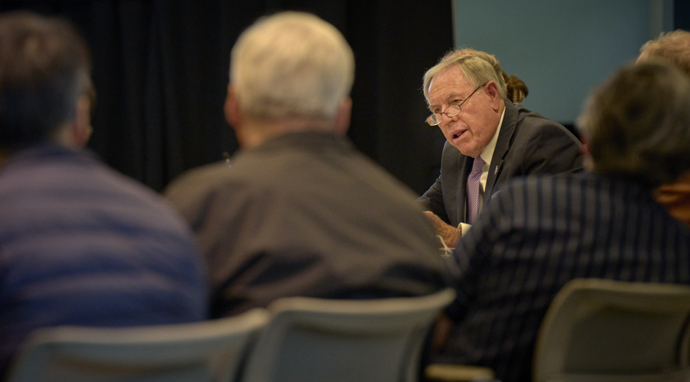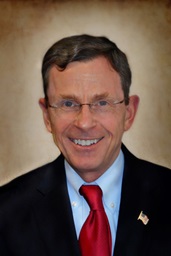Key points:
- A jury of United Methodist clergy heard from witnesses defending the actions of Bishop Minerva G. Carcaño, who is facing charges in the denomination’s first trial of a bishop in nearly a century.
- Carcaño testified that her suspension over the past 18 months has left her feeling “banished” from her family of faith.
- Following closing arguments in the afternoon of the third day, the jury began its deliberations.
Bishop Minerva G. Carcaño — The United Methodist Church’s first Latina bishop — testified that she feels great responsibility for the costs that the trial process she is undergoing has brought upon the church.
“Not only to the California-Nevada Conference, but the Western Jurisdiction and the cost to all of you,” she told a jury of fellow United Methodist clergy.
“Friends, I am embarrassed that I was not able to manage the work of this annual conference and its staff and its relationships in a way that would have prohibited this extended process that has not only affected me, but affected the California-Nevada Conference … and has brought disruption to the life of The United Methodist Church.”
The jury heard from the bishop and other witnesses who defended her work in the California-Nevada Conference as the trial of the bishop entered its third day at the headquarters of Wespath, the denomination’s pension agency. Following closing arguments in the afternoon, the jury began its deliberations.
This is the first trial of a bishop in The United Methodist Church or any of its predecessors since 1928.
For many across The United Methodist Church, Carcaño is renowned as a trailblazing church leader and champion of the marginalized. The announcement of Carcaño’s suspension from United Methodist ministry in March last year stunned many in the denomination. She said Western Jurisdiction leaders told her she was being suspended because they had received so many concerns about her creating a culture of fear and retaliation in the California-Nevada Conference.
Carcaño testified that her suspension over the past 18 months has left her feeling “banished” from her family of faith.
“I am not to engage with any United Methodists,” she said. “I was told that I could not serve in any way. I was not to be present in any one of our churches throughout our global United Methodist Church.”

During the first two days of the trial, the jury heard from witnesses called by the counsel for the church — essentially the prosecution — to testify where they think the bishop violated the limits of her authority on financial matters and engaged in retaliation against critics. Starting late afternoon Sept. 20, the counsel representing Carcaño began calling witnesses who could defend the bishop, including the bishop herself.
Carcaño, who was elected bishop in 2004 and has led California-Nevada since 2016, is facing four charges.
She is accused of disobedience to the denomination’s order and discipline, the undermining of another pastor, harassment and fiscal malfeasance. The charges — listed in the denomination’s Book of Discipline among the denomination’s chargeable offenses — stem from three complaints filed by people in the conference. She has pleaded not guilty to all of the charges.
To watch

The Rev. Staci Current, a former district superintendent and now pastor of Temple United Methodist Church in San Francisco, challenged many of the accusations that previous witnesses had leveled against Carcaño.
Both Current and Carcaño testified that there was no retaliation against clergy who criticized the bishop — that every appointment consideration was made with the hope of serving the interests of United Methodist ministry.
Bishops appoint superintendents to help oversee pastors and churches in a district and help advise in pastoral appointments. Ultimately, bishops have responsibility for fixing appointments of a conference’s clergy.
Current quoted a statement by the conference’s chancellor, the person who serves as a conference attorney, who said that there was no retaliation.
“Decisions by the bishop that are claimed by some to be taken in retaliation are in fact demonstratively tied to longstanding discussions that predate any claims of nepotism or other matters,” the chancellor wrote.
One issue in the case is Current’s hiring of the bishop’s daughter, Sofia Spaniolo Carcaño, to be the district superintendent’s administrative assistant in 2021 and the fact that Sofia was living rent-free in Park Presidio United Methodist Church’s parsonage in San Francisco.
Current testified that Sofia served a desperately needed role as an administrative assistant as well as providing crucial protection and weekly maintenance in an otherwise unused house that had been subject to break-ins.
The bishop also used the parsonage as housing when working in San Francisco during one week a month at Current’s request. Current argued that the use of the parsonage for the bishop’s housing saved the denomination’s Episcopal Fund a great deal of money on hotel expenses. She said the church also welcomed the bishop to use the parsonage.
Previous witnesses had raised concerns that the parsonage was part of Sofia’s compensation as an administrative assistant. Current also testified that staying in the parsonage was not considered part of the compensation and in fact Sofia had resided in the parsonage before her hiring. The bishop paid for the utilities.
Current testified that she requested and received authorization from the bishop’s cabinet of fellow district superintendents to use money from the First St. John’s Fund to renovate it so it could eventually be suitable housing for future use. The First St. John’s Fund is designated for church development in San Francisco.
“When the contractors got out there, they found out that the lead bathtub upstairs was starting to fall through the second floor into the first floor,” she said. “And they discovered pipe leaks and all kinds of stuff.”

The Rev. Odette Lockwood-Stewart, the pastor of Park Presidio United Methodist Church since Dec. 1, 2022, testified that the parsonage is now worth about $2.1 million and has a tenant whose rent goes to support the church’s mission.
During cross-examination, Carcaño faced questions about why she did not engage with the conference’s Council on Finance and Administration in dealing with questions stemming from her daughter’s hiring and housing situation. Instead, the bishop declared the matter closed on Feb. 28, 2022, after receiving a legal opinion from the conference chancellor.
The Rev. Janet Forbes, the counsel for the church, asked the bishop whether she has a responsibility to engage with the conference’s Council on Finance and Administration, which establishes and administers conference personnel policies.
“I am not denying that I have responsibility,” the bishop said. “But it was time for me to assume the authority of the Office of Bishop and pull us together in a different way.”
The Rev. Kristin Stoneking, who was the chair of the Council on Finance and Administration at the time, said the issue that most concerned the council was the use of the First St. John’s Fund, which she described as a conference fund.
“We were begging for conversation and engagement,” Stoneking said. “We didn’t want to be in conflict.”
She also testified that, like the bishop, she regrets that the matter has reached a trial.
“I'm sorry that we are here,” she said. “I also care deeply about our stewardship of our funds.”
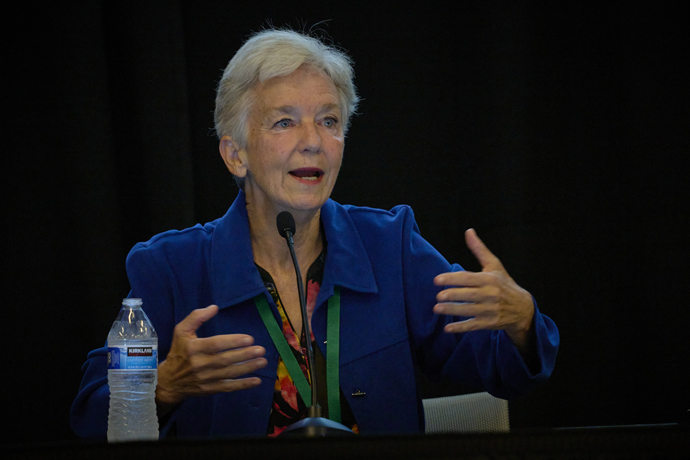
Another issue before the jury is how the bishop handled a dispute over the development of property of the closed Trinity United Methodist Church in Berkeley, California.
Both Current and the Rev. Mary Maaga, a member of the conference board of trustees, disputed that the bishop had usurped the trustees’ due diligence in efforts to choose a real estate broker to help develop the property.
Current and Carcaño also disputed witnesses’ accounts of the third matter in the case — the handling of the maternity leave and appointment of the Rev. Chelsea Constant when she was pregnant with her first child.
Carcaño said it was untrue that she ever denied Constant the full 12 weeks of maternity leave Constant requested. The issue in Constant’s case was that Constant planned to start a new church, and the bishop did not want to expend conference funds reserved for new church starts to pay for Constant’s leave. Carcaño also said the conference was dealing with a shortage of clergy associate pastor roles.
Ultimately, the bishop appointed Constant three-quarter time to her current appointment as an associate pastor and one-quarter time to her planned new church.
“I want our sisters to succeed,” the bishop said. “I want this church to be supportive of clergywomen, and we are the bearers of the children of this church in this world.”
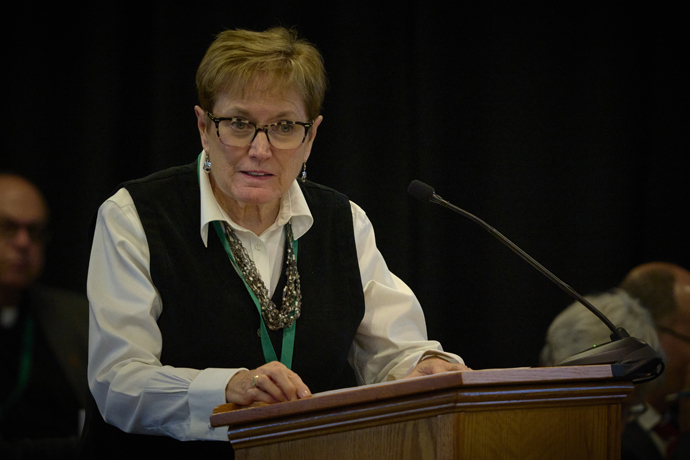
Closing arguments
After hearing testimony in the morning and after lunch, the jurors heard closing arguments in the late afternoon.
The Rev. Scott Campbell, Carcaño’s counsel and a veteran of representing clergy on trial, argued that the case should never have reached this point.
“On Tuesday, I stood before you for the first time and I suggested to you that we are in this place because perspective has been lost along the way,” he told the jury.
Subscribe to our
e-newsletter
“I hope that you’ve had an opportunity over the subsequent days to see for yourself what I meant. Matters that should have been resolved took on a life of their own. Perspective was lost because guilt was presumed at so many steps along the way,” he added. “And so now the story has been told from two very differing perspectives. And it’s up to you to determine not who is without fault but whether chargeable offenses were committed.”
Forbes, the counsel for the church, presented a roadmap of how various witness testimony and supporting documents connect to the four charges before the jury. Each charge had multiple specifications based on the accusations against the bishop.
“A charge will be proved if only one specification is found,” she told the jury.
She acknowledged that the situation is difficult for all involved.
“This moment is particularly hard for so many of us in part because power is so complex,” Forbes said.
“There is power and the sharing of power toward justice. There is power and the leverage of power for the common good. There is power and the abuse of power that diminishes both the one who wields and the one who is weighed down. A leader can demonstrate the faithful, empathetic, courageous and prophetic leadership and do harm in other ways.”
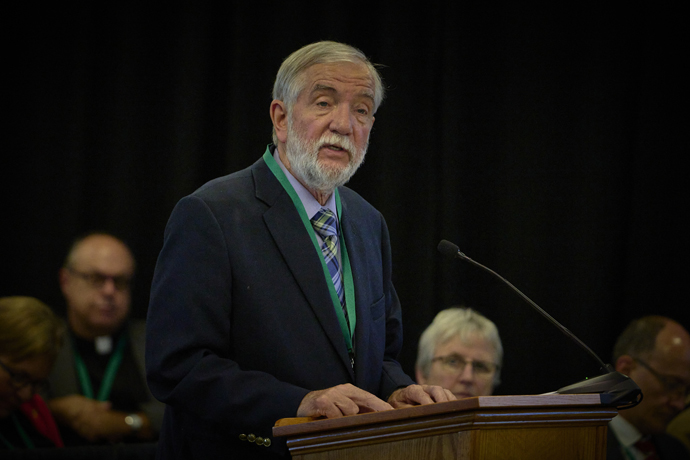
Prayer from presiding officer
Retired Bishop Alfred W. Gwinn has served as presiding officer — the equivalent of a judge — throughout the proceedings. Before dismissing the jury for their deliberations, he offered instructions and blessed them in their work.
After their dismissal, Gwinn acknowledged he was leery of offering a public prayer with the jury in the room for fear of biasing their deliberations in any way.
But with the jurors sequestered, Gwinn shared his prayer for God’s healing with those observing in person and online.
“Every person involved in this whole experience is beloved to you, including those who have great concerns and have manifested them by their presence in this trial, both in person and online,” Gwinn prayed. “We pray your grace to abound in our lives. We want you to be working in our lives so that whatever comes forth from this jury will only be a step in moving us toward healing.”
Hahn is assistant news editor for UM News. Contact her at (615) 742-5470 or [email protected]. To read more United Methodist news, subscribe to the free Daily or Friday Digests.
